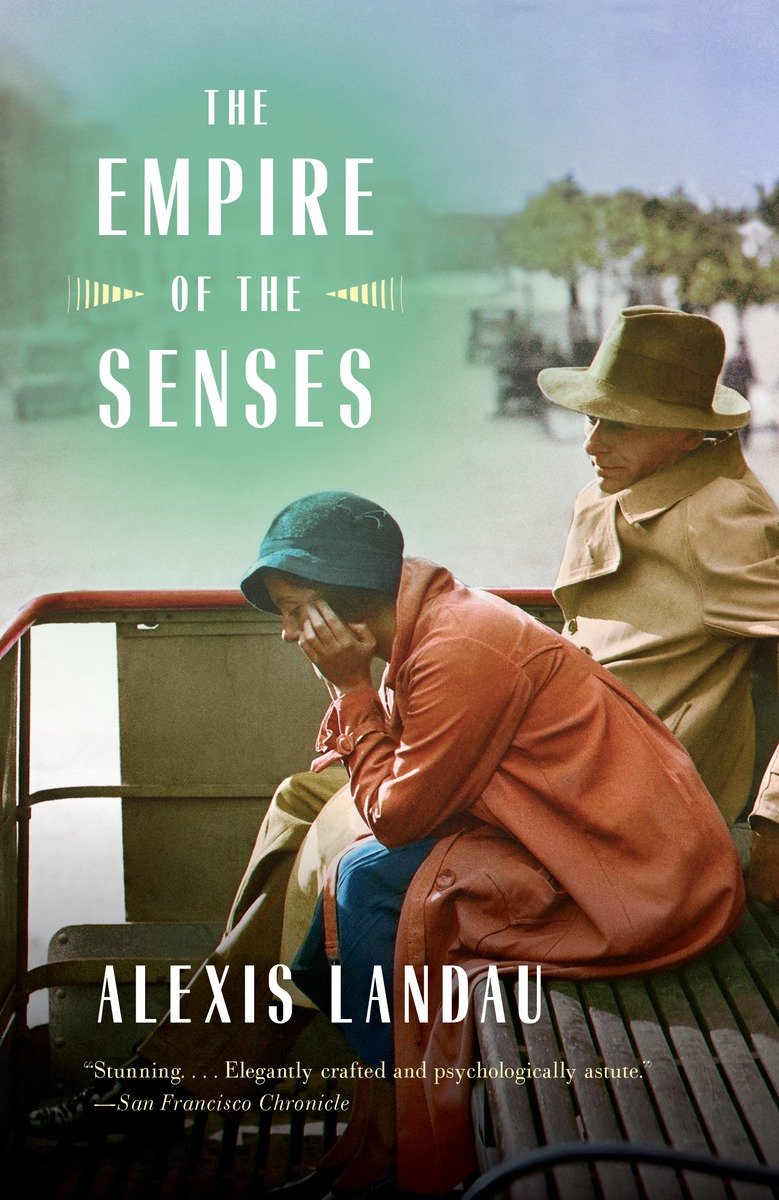A Novel: The Empire of the Senses
18.00 JOD
Please allow 2 – 5 weeks for delivery of this item
Description
A San Francisco Chronicle Best Book of the YearThe Empire of the Senses is an enthralling tale of love and war, duty and self-discovery. It begins in 1914 when Lev Perlmutter, an assimilated German Jew fighting in World War I, finds unexpected companionship on the Eastern Front; back at home, his wife Josephine embarks on a clandestine affair of her own. A decade later, during the heady, politically charged interwar years in Berlin, their children—one, a nascent Fascist struggling with his sexuality, the other a young woman entranced by the glitz and glamour of the Jazz Age—experience their own romantic awakenings. With a painter’s sensibility for the layered images that comprise our lives, this exquisite novel by Alexis Landau marks the emergence of a writer uniquely talented in bringing the past to the present.
Additional information
| Weight | 0.3632 kg |
|---|---|
| Dimensions | 2.794 × 13.208 × 20.32 cm |
| by | |
| Format | Paperback |
| Language | |
| Publisher | |
| Year Published | 2016-2-9 |
| Imprint | |
| Publication City/Country | USA |
| ISBN 10 | 080417346X |
| About The Author | Alexis Landau is a graduate of Vassar College. She received her MFA from Emerson College and her PhD in English Literature and Creative Writing from the University of Southern California. This is her first novel. Alexis lives with her husband and her two children in Santa Monica, California. |
“Stunning. . . . Elegantly crafted and psychologically astute.” —San Francisco Chronicle“A gripping, beautifully written saga. . . . A fresh and moving perspective on a piece of history we thought we already knew.” —Christina Baker Kline, author of Orphan Train“Poignant. . . . Richly appointed. . . . Life at any time and place, [Landau’s] title and her prose seem to say, is full of sensual beauty, if you choose to live it that way.” —Tablet “A sweeping family epic. . . . Internal dramas mirror the turbulent cultural landscape of 1920s Germany.” —Los Angeles Magazine“Lush, smart, sexy, affecting, interesting, beautifully researched, and well made. Spending time in the world of this novel is an absolute pleasure.” —Aimee Bender, author of The Particular Sadness of Lemon Cake “Landau evokes the Weimar Republic era with spellbinding detail and nuance, deftly capturing the zeitgeist in the characters’ colorful pursuits. . . . Lev’s struggle with his Jewish identity is also fascinating.” —Publishers Weekly “A top-notch literary saga with a gripping plotline. . . . Each perfectly crafted individual is fully involved in the surrounding world. In Landau’s hands, even a simple trip to the barber becomes meaningful and illustrative of the novel’s themes. The characters’ actions and thoughts are so three-dimensionally human that readers may forget they’re reading fiction.” —Booklist “[Landau] follows one family through two wars, four romances and one death with . . . thought and craft. . . . Highly readable.” —Kirkus “An impressive debut. . . . Where Landau truly excels is with her scope, her ability to guide [her characters] through the years, highlighting national tragedy while homing in on individual plights. The result is an expansive novel but also one skillfully in tune with the intricacies of the human spirit. . . . Gripping.” —The National (UAE) |
|
| Excerpt From Book | 1 The Eastern Front, August 1914 At first, the men were drunk off the euphoria of leaving Berlin, dreaming of virgin battlefields, singing and sharing flasks of whiskey when night fell. But Lev could not join in, blocked by a numb indifference that had settled over him as he observed the others with a clinical eye, picking apart their features, imagining how grotesque some of these men would appear if he sketched them asleep, their open mouths inviting flies. Yes, he’d volunteered when war was announced—but that day, only two days ago, already appeared fantastical, full of heated parades and brass bands, too much drink, his oxford shirt sticking to his chest in the humid air, and Josephine, waiting for him at home in the shaded courtyard, clutching her hat in her hands. She’d nearly ruined it, the one with the velvet flowers. He gently took it away from her and explained how he’d volunteered, to ensure he’d be called up first, to ensure no one would accuse him of shirking. He had said no one darkly because they both knew whom he meant—her mother and father, her brother, her whole Christian family, who despised him because he was a Jew. Even after seven years of marriage, seven biblical years, they hated him. Josephine had blinked back tears, mumbling something about how perhaps a shortage of equipment would delay his leave. No, no, he said. It wouldn’t. “And where did you hear that, about lack of equipment?” “Marthe.” He suppressed a laugh. “Still consulting your housemaid on such matters?” She shrugged. Lev nodded, trying to sympathize, but really, procuring information from Marthe? Large bumbling Marthe, who, although she expertly ironed the bedsheets and brought in afternoon tea at three o’clock sharp, never forgetting the lemon wedges, knew nothing of military matters. Josephine brushed a hair out of her eyes. “But why must you go directly?” Here she was, acting like a girl of eighteen when at twenty-five she had already suffered the agonies of childbirth, twice, giving him Franz and then Vicki. The children were asleep, napping in the nursery. Soon Marthe would wake them. He pushed away the thought of their warm sleepy bodies, of how they clung to him when they woke, as if he might slip away, as if they had already dreamed this. Tonight, Lev would explain his departure to Franz, who, at six, would understand, and Vicki, only four, who might not. After he went, Josephine would weave a grand story they could all believe, a story repeated over dinner and again at bedtime. A story that would lessen the blow of his absence. Was she capable? Or would she become so wrapped in her own sorrow, the tale would not hold? He must tell her what to say, exactly how to phrase it, so the children would understand why he had evaporated, like the receding condensation on the bathroom mirror Franz traced his finger through after Lev’s daily shave, drawing a gun with his pinky. He looked at her face. Admiral-blue eyes, as if spun from colored glass. The delicate bridge of her nose framed by high cheekbones. Her arched eyebrows the color of wheat, which now drew together in worry. Please tell them a good story, he thought. “But we still have some time?” He inhaled sharply. “I’m leaving tomorrow. On the three o’clock transport train.” Saying tomorrow made his heart pound, for her and for him. Too soon. So little time. He wondered if she would let him inside her tonight, their last night. On special occasions, she proved more compliant. Tonight, he thought, was a special occasion. The thought of her turning away, saying her head hurt, flashing that half-apologetic smile, infuriated him. He stared down at his lace-up oxfords. Scuffed tips. Should take them in, he thought. No point—tomorrow he’d be gone. He pictured his empty shoes standing in his dark closet, perfectly in line with the other pairs. Josephine touched his arm. “What are you thinking?” The courtyard’s uneven stones made their chairs lean slightly off kilter, and for a moment, it looked as if she might slide off. “My shoes are scuffed.” “What?” she said. How afraid should he feel of war? The question burned. But it didn’t matter how much fear he felt or didn’t feel—he was already in it, signed up and registered. And desertion promised death. They made sure everyone understood that. “How can you think of shoes, of all things? You’ll be gone by nightfall tomorrow and you don’t even know how to hold a gun.” He detected a hint of malice in her voice, as if he should know how to hold a gun properly, like her brother did, from shooting pheasant in Grunewald forest. But Lev had grown up in the city. Never touched a gun in his life. Never killed, not even a deer or a bird. Jews don’t hunt, he remembered his mother saying. Nor do they ride horses, sail, swim, fight in duels, or drink. And he remembered thinking: What do Jews do then? All the valiant heroic activities were reserved for gentiles. For men like Josephine’s brother, Karl von Stressing, who taunted Lev with his gray-and-white dappled steed as he trotted through the Tiergarten, with his saber and his hunting rifle and his tall black boots. But now they were both privates enlisted in the German army, both fighting for Germany, both shooting and killing and then afterward, drinking in the trenches. Lev already tasted the vodka, clear and pure and burning in his throat. “How will you learn in time?” Josephine asked, more gently. “Training’s in the barracks close to the front, for four weeks, and then we’ll be sent off into the jaws of Hell,” he said, realizing how flat it sounded. “Please don’t say that.” “I’m sorry.” He looked into her watery light eyes. “Back by Christmas. I promise.” When his mouth closed in on that word, promise, Lev knew it was a lie. … |
Only logged in customers who have purchased this product may leave a review.






Reviews
There are no reviews yet.